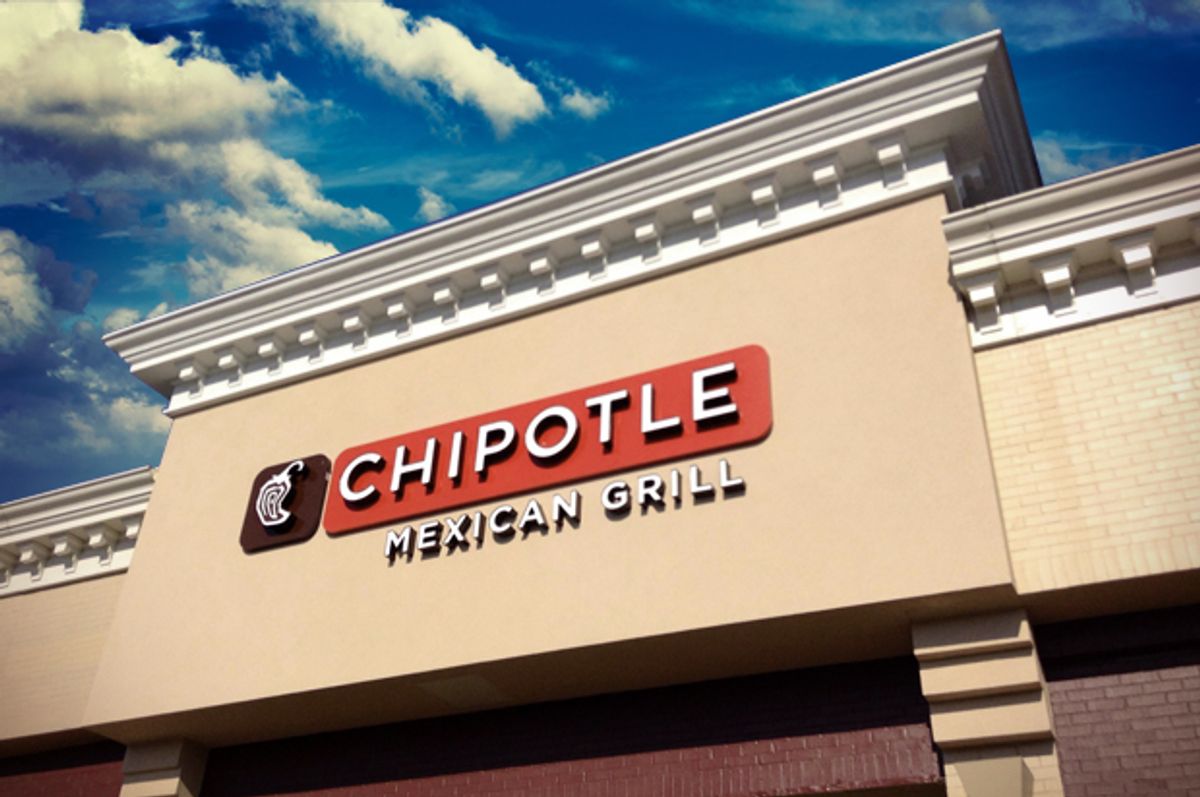The cynically minded can't help noticing that Chipotle, despite suffering a potential blow to its first-quarter results, came out of this week's pork-opolypse looking quite virtuous.
Critics (this one included) have taken digs in the past at the company's practice of serving conventional alternatives when it's unable to source local, humanely raised and antibiotic-free meat, so that customers end up paying higher prices for unenlightened fare. However, by temporarily pulling pork (sorry) from a third of its restaurants -- after discovering that one of its suppliers was violating its animal-treatment standards -- the company proved that it is willing to put its foot down when it comes to the way its pigs are treated en route to becoming carnitas.
As Chipotle spokesman Chris Arnold told ABC News of the decision to stop serving pork, "This is fundamentally an animal welfare decision, and is rooted in our unwillingness to compromise our standards where animal welfare is concerned."
Niman Ranch, Chipotle's main pork supplier, found a way to up its production by 15 to 20 percent, although according to Chipotle spokesperson Chris Arnold, that won't be enough to fill the entire gap. (The plan, an exec told Business Insider, will likely involve utilizing different cuts of meat.) But the company's actions, intentionally or not, also sent an important message about the unyielding economics of ethical meat production: If you truly want to sell only humane and sustainable meat, there’s not going to be enough to go around.
Humanely raised pigs may be "trending," but the small, pasture-based operations favored by mindful consumers can only sustain so much demand. It's estimated that only a few hundred thousand of the United States' 65.9 million pigs are raised humanely. “This way of raising pigs is still a very small part of the business," Niman founder Paul Willis told the New York Times last year. "400,000 hogs are killed each day and we can supply only 3,000 pigs a week.”
And as Chipotle sets its sights on becoming America's new fast food giant, it's going to keep running against this fundamental contradiction — that it’s the streamlined, unsustainable and, yes, inhumane, factory farm system that makes fast food possible.
Christopher Leonard described how this came to be in his 2014 book, "The Meat Racket," which exposed, among other things, the unholy alliance between Tyson Foods' new model for streamlined, mechanized chicken production and McDonald's' development of a formula for a processed chicken nugget. The factory farm, with its specially bred animals, provided the meat at the lowest possible price point, while McDonald's, through the McNugget, provided a "chicken product whose price didn’t fluctuate with the wholesale market for fresh chicken." The result transformed both industries: Burger King adopted its own chicken nuggets in order to compete, while meat producers, including pork and cattle companies, found themselves forced to start imitating Tyson's model in order to stay in the game.
It's a model that now drives almost all meat production as we know it: the modern factory farm from which Chipotle works so hard to distinguish itself. Examples from industrialized pork production in particular, while not necessarily unique, are certainly macabre: Journalist Ted Genoways, in his exposé of Spam giant Hormel Foods, describes a system in which exploited, often undocumented workers take out their frustrations by abusing animals, and where worker and consumer safety is compromised by an ever-quickening assembly line that doesn't stop even for severed fingers. "The only way that you end up with a system that can be fully mechanized and automated and streamlined," Genoways told Salon, "is to have animals that are less and less individuals."
Even if Chipotle finds a way to continue to opt out from the majority of those evils, certain realities are undeniable. Chief among them is the fact that the livestock industry, globally, is responsible for as much as 15 percent of our total greenhouse gas emissions. Any attempt to increase meat production -- or even continue with the status quo -- no matter how otherwise ethical and sustainable, will always come up against the reality of climate change.
This same contradiction, by the way, likely explains why McDonald's' new industry-created guidelines for sustainable beef production are so frustratingly vague: If the company were truly to start purchasing 100 percent of its beef from “verified sustainable sources," as it claims it wants to do by 2016, while still pushing some 75 burgers every second, it's hard to believe that it wouldn't have to set the bar low for its suppliers. And indeed, glaringly absent from the draft standards, notes Mother Jones' Dana Liebelson, is anything addressing the use of antibiotics; other aspects addressing emissions and fair treatment of workers are left open to the interpretation of different suppliers.
If Chipotle's big stand for pork was, at least in part, a gambit for attention, it's particularly timed to the big promotion it has coming up at the end of the month: For one day only, the chain is enticing customers to try its tofu sofritas by offering coupons for a second free burrito. If they're lucky, they'll gain converts to the vegan meal option, because as the company grows, the best way -- and really the only way -- they'll be able to keep selling ethical, sustainable meat will be to sell less of it.
1/20/2015: This article has been updated to indicate that the additional supply provided by Niman Ranch will not entirely resolve Chipotle's pork shortage.

Shares